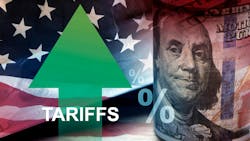Tariffs Drive Price Pressures, Slow Recovery for Chemical Producers
Chemical manufacturers and industrial suppliers are facing renewed price volatility as tariffs and trade disputes continue to ripple through global supply chains. Chemical Processing’s sister publication, IndustryWeek, reports that executives from MSC Industrial, W.W. Grainger and Regal Rexnord told investors that supplier cost increases tied to China-influenced raw materials are forcing additional price hikes.
MSC Industrial Sees Unprecedented Supplier Inflation
MSC’s COO said the company experienced more inflation between June and August than in the nine months following the pandemic, while CEO Erik Gershwind noted that ongoing raw material pressures could drive further increases into 2026. Grainger leaders reported “over 1,000 negotiations” with suppliers to manage rising costs, highlighting the scale of the challenge.
Regal Rexnord Delays Recovery Amid Tariff Costs
Regal Rexnord now expects tariffs to add $175 million in costs this year, pushing its recovery timeline to mid-2026. CFO Rob Rehard said the company is offsetting the impact through cost cuts, supplier changes, and some price increases, while CEO Louis Pinkham noted associates are actively managing the ongoing effects.
Chemical Processing reviewed earnings statements for a deeper dive into the chemical industry.
Eastman Chemical Grapples with Inventory Cycles and Softer Demand
Tariffs and trade disputes have had a significant impact on Eastman Chemical's business in 2025, creating both headwinds and opportunities across different segments.
“The trade disputes have exaggerated this dynamic with all the pull forward of material that happened in the first half of the year to get ahead of tariff risk,” said Mark Costa, Eastman CEO, in a Nov. 4, 2025, earnings call.
“And now with consumer demand being sort of weaker than that was expected in the first half—for the back half, it's taking them a lot longer to unwind that inventory." Eastman is reportedly benefiting from tariff protection in its key U.S. markets for specialty polyesters, rPET, chemical intermediates and ag chemicals, and is focusing on cost management, innovation, and geographic diversification.
LyondellBasell Sees Improving Polyethylene Demand Despite Trade Volatility
LyondellBasell expects minimal direct impact from tariffs. “In recent months, PE [polyethylene] demand has started to improve following the multiyear post-COVID downturn,” said Peter Z. Vanacker, CEO and executive director, in an Oct. 31, 2025, earnings call. “In both North America and Europe, 2025 domestic demand for polyethylene is the strongest we have seen since the start of the downturn in the third quarter of 2022.
Despite the recent volatility in U.S. exports caused by shifting trade and tariff policies, third-quarter year-to-date North American demand is up by 2.5% relative to 2024. After a prolonged weakness following the onset of the Russia-Ukraine conflict, August year-to-date polyethylene volumes in Europe are up approximately 3% compared to the same period last year.”
Read the full story at IndustryWeek for additional insights into industrial pricing strategies amid trade pressures.
About the Author
Amanda Joshi
Managing Editor
Amanda Joshi has more than 18 years of experience in business-to-business publishing for both print and digital content. Before joining Chemical Processing, she worked with Manufacturing.net and Electrical Contracting Products. She’s a versatile, award-winning editor with experience in writing and editing technical content, executing marketing strategy, developing new products, attending industry events and developing customer relationships.
Amanda graduated from Northern Illinois University in 2001 with a B.A. in English and has been an English teacher. She lives in the Chicago suburbs with her husband and daughter, and their mini Aussiedoodle, Riley. In her rare spare time, she enjoys reading, tackling DIY projects, and horseback riding.

